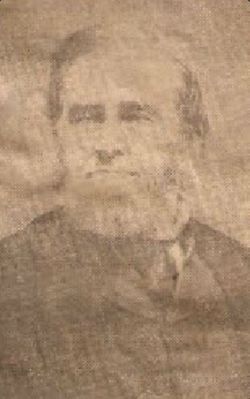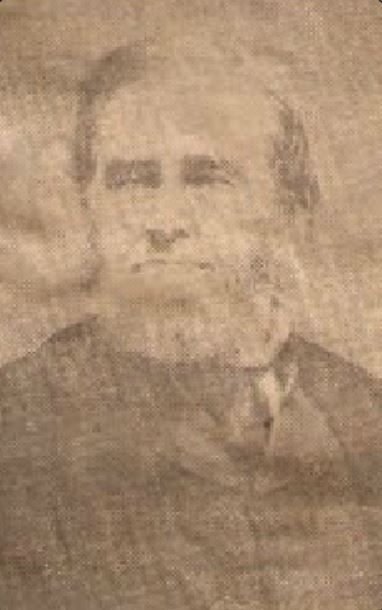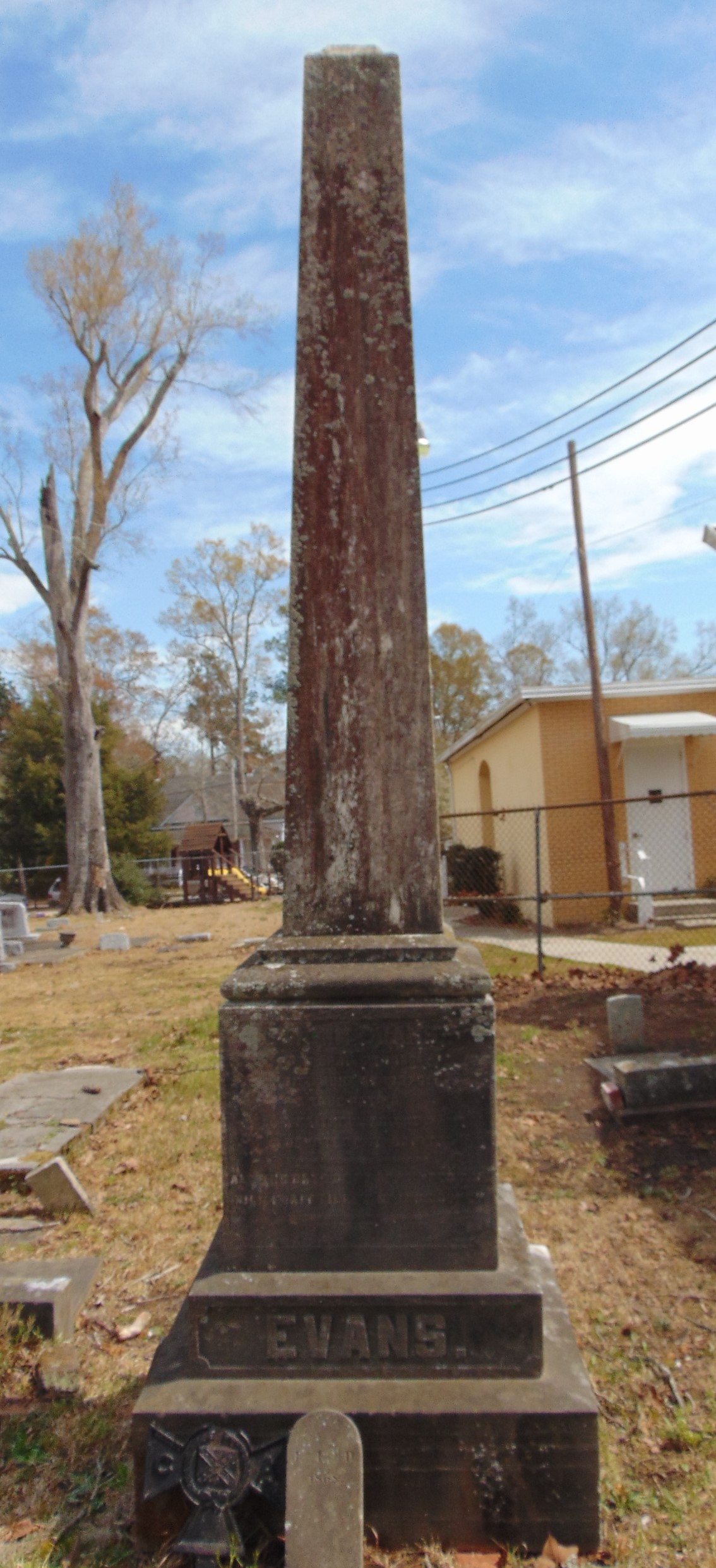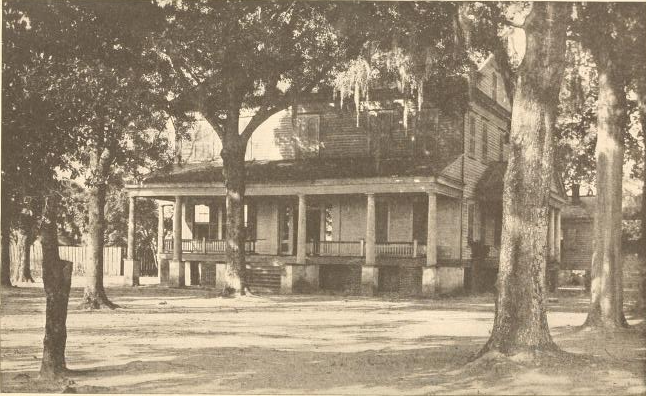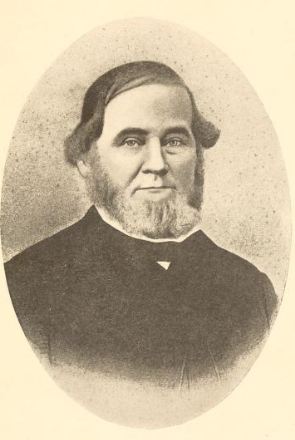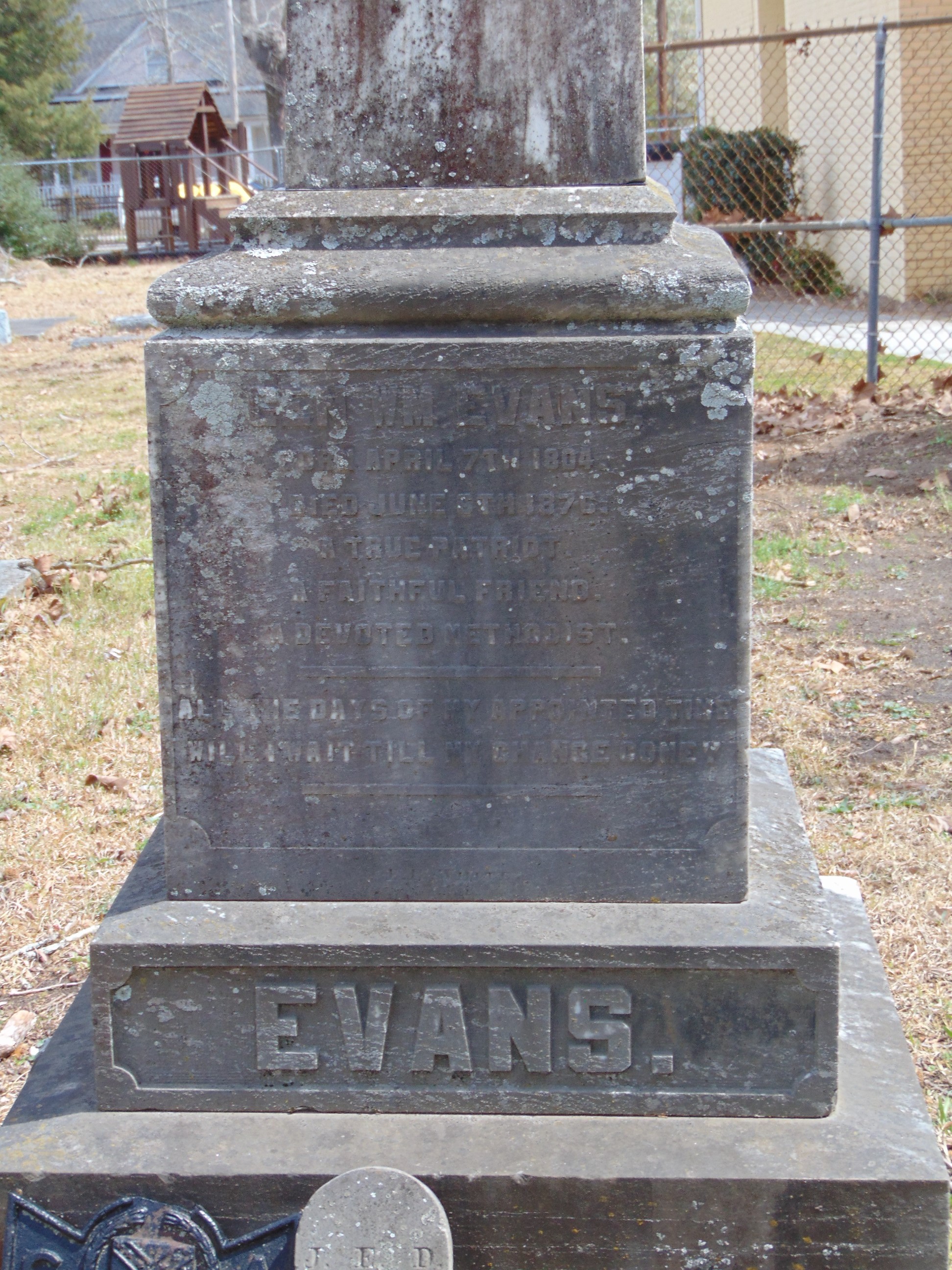Gen. William Evans, was born April 7th, 1804, near the spot where he breathed his last; was married to Miss Sarah Ann, daughter of Gen. Thomas Godbold, June 19th, 1827; joined the Methodist Church in 1855; and died near Marion, S.C., June 6th, 1876.
Physically he was one of the most powerful of men. Having a naturally well-wrought frame, he in early life, by athletic exercises and manual labor, developed symmetrical and muscular manhood of wonderful strength and powers of endurance, in so much that no man of my acquaintance, on this year or so ago, seemed more likely to attain to his fourscoure, or even five score years than he. His mental constitution was scarcely less remarkable.
Although deprived of the training of the schools, his vigorous intellect began early and successfully to investigate the problems of practical life. With a mental vigor that did not hesitate to grapple with difficulties which would have appalled most men, and with a tenacity of purpose which never calculated upon defeat, he with comparatively small beginnings amassed a large fortune.
In his social nature Gen. Evans was happily endowed. Dignified, yet genial and courteous, his mind stored with interesting reminiscences of extensive travel and close observation, his ordinary conversation sparkling with humor, he was a most agreeable companion; and he never seemed more cheerful than when dispensing a generous hospitality to his numerous friends. His fellow citizens illustrated their appreciation of his qualities of head and heart by electing him from time to time to positions of honor and of trust.
When a young man he was elected to the command of a regiment, a little later to the command of a brigade. When twenty-eight years of age he represented Marion district in the Nullification Convention of 1832. He served three terms in the Legislature of his native State, and in 1875 he was sent to the Tax-payers' Convention. His popularity proved to him, as it often does to men, an expensive luxury, his friends drawing upon his credit until first and last he paid nearly fifty thousand dollars as security.
In his domestic relations he was peculiar. Few men, perhaps, realized a more profound interest in their children, yet he seemed all the while laboring to conceal his concern in their well being, albeit his energies were being spent in making provision for their future comfort. The companion of his struggles and his triumphs for nearly fifty years survives him; her experience is merging into the mellow halo of the evening hour.
Gen. Evans, though a member of the Church for about twenty years, did not, until about three years ago, devote himself in any appreciable degree to the work of his salvation. During a revival in the town of Marion, in 1878, he seemed to be aroused to a clearer apprehension of the value of his immortal interests, and from that period he devoted much of his time to reading the Scriptures and to religious meditation. Toward the close of his life, in conversation with the writer, and with his pastor and others, he gave assurances that he was making ready for his account at the bar of God. For several years immediately preceding his death, he had experienced unmistakable premonitions of his rapidly approaching dissolution, and having arranged his business affairs he awaited in hope the solemn event. As he had anticipated, the summons came suddenly. Sitting on his piazza, in the act of reading a letter just opened, he fell upon his face, and though the members of his household gathered speedily about him, he was seen to breathe no more. He was a good citizen, an earnest Methodist, and as we believe, at the least, a sincere Christian. He was buried in Marion; the business houses were all closed, and a large concourse attended his funeral. Dr. Fleming, brothers Stokes, W. Thomas, and Wolling, taking part in the solemn services.
From The Southern Christian Advocate (5 September 1876)
Children:
(1) Charles Gamewell Evans, born May 30, 1828; died March 04, 1829.
(2) Mary Elizabeth Evans.
(3) Sarah Catherine Evans, born August 29, 1830; died August 06, 1862.
(4) James Hamilton Evans
(5) Elizabeth Jane Evans
(6) Annie Maria Evans
(7) Martha Louisa Evans
(8) William Thomas Evans
(9) Julia Rosa Evans
(10) Margaret Ellen Evans
"General William Evans was born on the "Old Evans Homestead," near the village of Marion, then known as Gilesborough, S. C, on the 7th of April, 1804.
Due to the death of his father and the remarriage of his mother two years afterwards, he was thrown much upon his own resources at a very tender age. His step-father, Squire Wayne, was exceedingly harsh in his treatment of William and his younger brother, Nathan, and at the early age of twelve and ten years, respectively, the two boys were torn from their mother's side and apprenticed to some journeyman mechanic in Georgetown. William, a fine, sturdy lad, swore he would thrash the cruel step-father, and he kept his word. Deprived thus in his youth of the advantages of an education, he, nevertheless, by studious application, overcame this loss, and his vigorous intellect and integrity of character soon forced him into notice and position, while his energy and thrift enabled him to amass a considerable estate. His strong personality was not long in gaining recognition through his section and throughout the State. While yet a young man he was elected to the command of a regiment of militia and soon thereafter he received the appointment to the command of the "Eighth Brigade of South Carolina" as Brigadier General, under the hand of his Excellency, Governor Robert Y. Hayne, his commission dating April 12, 1833, during that stern and troubled period when South Carolina imminently approached the crisis which finally did culminate in 1860 and plunged the nation into four years of war. This commission is countersigned upon the back by Maj. Gen. Joseph Alston, afterwards the Governor of the State, and upon the back also appears the formal oath administered by the State to her officers to "execute and enforce the Ordinance to nullify certain Acts of the Congress of the United States, etc.," which was in pursuance of the famous Ordinance of Nullification passed in Convention on the 24th of November, 1832, of which General Evans was a delegate from his native
County.
General Evans thrice represented his District in the General Assembly of the State (1838, 1846-1850), and was a member of the Tax Payers Convention of 1874, which was the initial step taken by the white citizens to throw off the odious yoke of carpet-bagger and negro rule. During the war he was beyond the age limit for service, but was enlisted
with the reserves and was actively engaged in the last attempt to check Sherman's hordes in their march to the sea.
From athletic exercises in his youth. Gen. Evans had developed his naturally strong physique to almost gigantic strength, so that even in his old age he was capable of enduring the greatest fatigue. In his social nature he was most happily endowed. Possessed of ample dignity, his geniality and courtesy of manner, with his mind well stored with the interesting reminiscences of a long life and wide travels, and his conversation sparkling with intelligence and humor, rendered him a most agreeable companion and estimable friend, and these charming attributes of his nature never showed to more advantage than when he was dispensing the generous hospitalities of his house "Oak Hall," the beautiful home which he had built upon the lands which his fathers had taken from the Indians as the first grantees from the State. This old home, so appropriately named, for it is surrounded by monarch oaks of a beautiful variety, indigenous to that country, is still in the possession of the family, the home of four generations, and is now owned by General Evans' son and namesake, William T. Evans, Esq.
General Evans was a man of profound religious temperament, and was for many years a staunch member of the Methodist Church in Marion, doing much, in his quiet way, to establish that faith through his section of the State. His death occurred from apoplexy, on the 6th of June. 1876, causing the greatest sorrow throughout the community; the places of business were closed in his honor, and he was buried with Masonic and military honors, the whole militia of the District turning out to pay their last marks of respect to their late commander." - History of Nathaniel Evans of Catfish Creek
Gen. William Evans, was born April 7th, 1804, near the spot where he breathed his last; was married to Miss Sarah Ann, daughter of Gen. Thomas Godbold, June 19th, 1827; joined the Methodist Church in 1855; and died near Marion, S.C., June 6th, 1876.
Physically he was one of the most powerful of men. Having a naturally well-wrought frame, he in early life, by athletic exercises and manual labor, developed symmetrical and muscular manhood of wonderful strength and powers of endurance, in so much that no man of my acquaintance, on this year or so ago, seemed more likely to attain to his fourscoure, or even five score years than he. His mental constitution was scarcely less remarkable.
Although deprived of the training of the schools, his vigorous intellect began early and successfully to investigate the problems of practical life. With a mental vigor that did not hesitate to grapple with difficulties which would have appalled most men, and with a tenacity of purpose which never calculated upon defeat, he with comparatively small beginnings amassed a large fortune.
In his social nature Gen. Evans was happily endowed. Dignified, yet genial and courteous, his mind stored with interesting reminiscences of extensive travel and close observation, his ordinary conversation sparkling with humor, he was a most agreeable companion; and he never seemed more cheerful than when dispensing a generous hospitality to his numerous friends. His fellow citizens illustrated their appreciation of his qualities of head and heart by electing him from time to time to positions of honor and of trust.
When a young man he was elected to the command of a regiment, a little later to the command of a brigade. When twenty-eight years of age he represented Marion district in the Nullification Convention of 1832. He served three terms in the Legislature of his native State, and in 1875 he was sent to the Tax-payers' Convention. His popularity proved to him, as it often does to men, an expensive luxury, his friends drawing upon his credit until first and last he paid nearly fifty thousand dollars as security.
In his domestic relations he was peculiar. Few men, perhaps, realized a more profound interest in their children, yet he seemed all the while laboring to conceal his concern in their well being, albeit his energies were being spent in making provision for their future comfort. The companion of his struggles and his triumphs for nearly fifty years survives him; her experience is merging into the mellow halo of the evening hour.
Gen. Evans, though a member of the Church for about twenty years, did not, until about three years ago, devote himself in any appreciable degree to the work of his salvation. During a revival in the town of Marion, in 1878, he seemed to be aroused to a clearer apprehension of the value of his immortal interests, and from that period he devoted much of his time to reading the Scriptures and to religious meditation. Toward the close of his life, in conversation with the writer, and with his pastor and others, he gave assurances that he was making ready for his account at the bar of God. For several years immediately preceding his death, he had experienced unmistakable premonitions of his rapidly approaching dissolution, and having arranged his business affairs he awaited in hope the solemn event. As he had anticipated, the summons came suddenly. Sitting on his piazza, in the act of reading a letter just opened, he fell upon his face, and though the members of his household gathered speedily about him, he was seen to breathe no more. He was a good citizen, an earnest Methodist, and as we believe, at the least, a sincere Christian. He was buried in Marion; the business houses were all closed, and a large concourse attended his funeral. Dr. Fleming, brothers Stokes, W. Thomas, and Wolling, taking part in the solemn services.
From The Southern Christian Advocate (5 September 1876)
Children:
(1) Charles Gamewell Evans, born May 30, 1828; died March 04, 1829.
(2) Mary Elizabeth Evans.
(3) Sarah Catherine Evans, born August 29, 1830; died August 06, 1862.
(4) James Hamilton Evans
(5) Elizabeth Jane Evans
(6) Annie Maria Evans
(7) Martha Louisa Evans
(8) William Thomas Evans
(9) Julia Rosa Evans
(10) Margaret Ellen Evans
"General William Evans was born on the "Old Evans Homestead," near the village of Marion, then known as Gilesborough, S. C, on the 7th of April, 1804.
Due to the death of his father and the remarriage of his mother two years afterwards, he was thrown much upon his own resources at a very tender age. His step-father, Squire Wayne, was exceedingly harsh in his treatment of William and his younger brother, Nathan, and at the early age of twelve and ten years, respectively, the two boys were torn from their mother's side and apprenticed to some journeyman mechanic in Georgetown. William, a fine, sturdy lad, swore he would thrash the cruel step-father, and he kept his word. Deprived thus in his youth of the advantages of an education, he, nevertheless, by studious application, overcame this loss, and his vigorous intellect and integrity of character soon forced him into notice and position, while his energy and thrift enabled him to amass a considerable estate. His strong personality was not long in gaining recognition through his section and throughout the State. While yet a young man he was elected to the command of a regiment of militia and soon thereafter he received the appointment to the command of the "Eighth Brigade of South Carolina" as Brigadier General, under the hand of his Excellency, Governor Robert Y. Hayne, his commission dating April 12, 1833, during that stern and troubled period when South Carolina imminently approached the crisis which finally did culminate in 1860 and plunged the nation into four years of war. This commission is countersigned upon the back by Maj. Gen. Joseph Alston, afterwards the Governor of the State, and upon the back also appears the formal oath administered by the State to her officers to "execute and enforce the Ordinance to nullify certain Acts of the Congress of the United States, etc.," which was in pursuance of the famous Ordinance of Nullification passed in Convention on the 24th of November, 1832, of which General Evans was a delegate from his native
County.
General Evans thrice represented his District in the General Assembly of the State (1838, 1846-1850), and was a member of the Tax Payers Convention of 1874, which was the initial step taken by the white citizens to throw off the odious yoke of carpet-bagger and negro rule. During the war he was beyond the age limit for service, but was enlisted
with the reserves and was actively engaged in the last attempt to check Sherman's hordes in their march to the sea.
From athletic exercises in his youth. Gen. Evans had developed his naturally strong physique to almost gigantic strength, so that even in his old age he was capable of enduring the greatest fatigue. In his social nature he was most happily endowed. Possessed of ample dignity, his geniality and courtesy of manner, with his mind well stored with the interesting reminiscences of a long life and wide travels, and his conversation sparkling with intelligence and humor, rendered him a most agreeable companion and estimable friend, and these charming attributes of his nature never showed to more advantage than when he was dispensing the generous hospitalities of his house "Oak Hall," the beautiful home which he had built upon the lands which his fathers had taken from the Indians as the first grantees from the State. This old home, so appropriately named, for it is surrounded by monarch oaks of a beautiful variety, indigenous to that country, is still in the possession of the family, the home of four generations, and is now owned by General Evans' son and namesake, William T. Evans, Esq.
General Evans was a man of profound religious temperament, and was for many years a staunch member of the Methodist Church in Marion, doing much, in his quiet way, to establish that faith through his section of the State. His death occurred from apoplexy, on the 6th of June. 1876, causing the greatest sorrow throughout the community; the places of business were closed in his honor, and he was buried with Masonic and military honors, the whole militia of the District turning out to pay their last marks of respect to their late commander." - History of Nathaniel Evans of Catfish Creek
Family Members
Advertisement
Records on Ancestry
Advertisement
